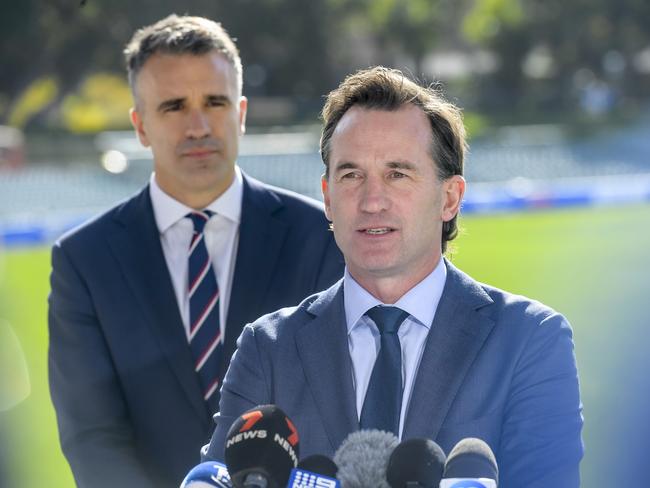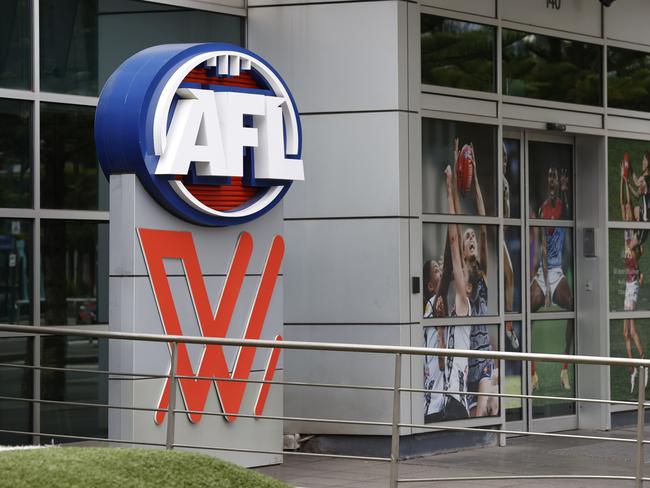Jeff Kennett: AFL must get real on its drug code, or courts will
The leadership the SA Premier displayed over Gather Round is sorely needed in the AFL’s drugs policy, writes Jeff Kennett.
Opinion
Don't miss out on the headlines from Opinion. Followed categories will be added to My News.
Another successful weekend for the AFL but the biggest winner was South Australian Premier Peter Malinauskas.
For a few shekels he secured the whole AFL and the media to SA and gave his community a massive confidence boost.
No doubt the state will continue building on the event in every passing year.
The Gather Round is having the same effect on the SA community as when Victoria “borrowed” the Formula One Grand Prix from Adelaide in 1996. Confidence changing, so congratulations to Premier Malinauskas.
The AFL needs now to show the same leadership and have the courage to have a proper review of its drug policy. It is currently not fit for purpose.
Because the welfare of employees is the highest priority of all leaders and organisations, it is incumbent on the AFL, clubs and the AFLPA to have and support an effective drug policy.
Saying the current policy is working, and many players have benefited from it, without quantifying numbers, is not good enough. It is the AFL stonewalling.


Without an effective approach easy to understand for all parties – and enforceable – the risk is we have a policy that is potentially deadly and subject to litigation.
The drug policy must apply to all AFL and AFLW players, and employees of the AFL and clubs.
The code should apply equally for illicit and performance-enhancing substances.
Before signing contracts, all potential employees/players in the AFL should be given an educational briefing about the drug code, and what will be required of them should they sign to join the industry.
Joining the AFL at any level is a voluntary decision. An individual’s decision to sign a contract after a clear briefing on the drug code is their acceptance of the ramifications and consequences within the code.
No individual has to sign to AFL or a club if they do not agree to be bound by the drug code.
Once an employee/player signs a contract to be employed within the AFL, to use an Olympic term, that person becomes a part of the AFL’s “registered testing pool”.
That means the person becomes eligible for testing for drugs at any time in or out of season.
So, what drugs should be covered by the AFL drug code? All illicit and performance enhancing drugs.
Illicit drugs are those that are illegal to take such as cannabis, heroin and cocaine, and the non-medical use of drugs that are legally available.
Performance-enhancing drugs, often referred to as PEDs, are those substances used to improve any form of activity performance. There are instances of such products being developed or reconstructed to avoid detection. Here’s how this should all work:
Notification of a first offence:
The individual, club doctor, the president, or leader of the organisation should be told of a positive test; if a footballer, their football manager and coach should be immediately notified.
The reason for this is to ensure that the individual’s cohort of workplace colleagues are not involved in the same practice.

Consequences for breaching the AFL code:
The individual who has been detected having breached the drug code is named and suspended from playing, without pay, for the equivalent of half a season.
Subsequent breaches:
On a second breach the individual is named, and suspended from play for a year, without pay.
On a third strike, the individual is sacked from employment and forfeits the right for employment within the AFL for 10 years in any capacity.
If a player is detected, the club of which he is a member has no right to appoint a substitute to its list for the period of the suspension. Any AFL official/person who is found to have acted in a way to avoid/ undermine the AFL drug policy will immediately be suspended from employment or service in the AFL.
Counselling and rehabilitation:
If an employee is found to have breached the drug code, they will be required to attend an appropriate course for the period of the suspension to assist with their health and wellbeing and any accompanying mental health issues.
Self-reporting to avoid a strike:
This avenue, to avoid the consequences of the code, will be removed.
There are several industries where the taking of drugs is strictly forbidden. If detected it leads to immediate suspension of the individual. Or in the case of the Olympic movement, up to four years suspension. What I am proposing here might seem harsh, but it is the basis of a genuine, enforceable drug code within the AFL which must have consequences if breached.
The league is answerable to no one but itself, so it must heal itself, otherwise one day the courts might do it for them.
Play on.
Jeff Kennett is a former Victorian Premier
Originally published as Jeff Kennett: AFL must get real on its drug code, or courts will



